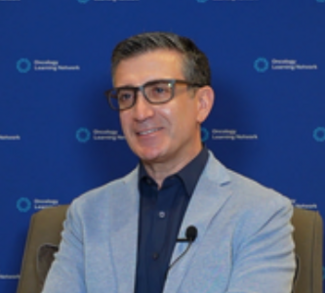CTLA-4 Inhibition for Lung Cancer
Luis Raez, MD, Memorial Cancer Institute, Fort Lauderdale, Florida, discusses the use of CTLA-4 inhibitor for patients with lung cancer.
At the Great Debates in Solid Tumors meeting in Miami, Florida, Dr Raez argued against the use of CTLA-4 inhibition for patients with lung cancer, debating Estelamari Rodriguez, MD, MPH, University of Miami, who argued for the use of CTLA-4 inhibition.
Transcript:
Hi everybody. My name is Luis Raez. I'm a thoracic oncologist. I work as a medical director and Chief Scientific Officer of Memorial Cancer Institute, Florida Atlantic University here in Fort Lauderdale. It was a very exciting meeting and debate. I had to talk against the use of anti–CTLA-4. Like everything in cancer and medicine, there is never the word never. For that reason, I think there is a very limited role.
I started by discussing the fact that the amount of use of these drugs in the market, I put up some business data, is very limited. In other words, independently whether you like them or not, you use them a lot or not, the fact is that very few people use. It is still billions of dollars in market but compared with the amount of use of anti–PD-1/PD-L1s is very small.
I was trying to argue why this happens and one obvious reason is maybe they don't work. We have anti–CTLA-4 data, in combination with pembro[lizumab] or with durva[lumab] that shows that it doesn't work. But we know it works in several populations. For example, it works for patients that have a PD-1 less than 1% that population benefits. But, unfortunately, it's only one-third of our patients. But that population benefits.
And the problem is that also the CTLA-4 inhibitors came late. When we have a patient with metastatic lung cancer and for immunotherapy, we have 11 options. Eleven options, and 3 of these are anti–CTLA-4, and they came late. A lot of people are already comfortable with other options.
Another group, maybe especially in Florida, we have a lot of frail patients. And I presented data that there is a benefit using ipi-nivo [ipilimumab plus nicolumab], in frail patients, senior citizens. Also, we have patients that can benefit from that. We have patients here in Florida, 85 [years old], or 90. I have a 96-year-old on ipi-nivo. But they are a minority, they are few. And then the bulk of the discussion and the Q&A with the people in the audience was the fact that of course we have these patients with STK11 and KIT mutations, that confer a bad prognosis. Retrospective data, even my own data because I have participated in some of these studies, show that they don't do very well with the conventional chemo-immuno[therapy]. And we need the anti–CTLA-4s. But this group, between STK11 and KIT mutations, we have no more than 20% of the tumors. For this group, we need a prospective drug trial, and the trial is called TRITON that we also discussed, but I think while we wait for the data, it is hard not to offer the patient anti–CTLA-4 therapy. Because we have seen in all retrospective studies how bad these patients do with conventional therapy.
And finally I showed data — We are participating in a new anti-CTLA-4 called ONC-392 [gotistobart, BNT316]. Maybe the solution is we get better anti–CTLA-4. Then, maybe we'll use them more often. I showed a table that is amazing: we have more than 30 in development, maybe that will give an inch to increase the use of anti–CTLA-4, if we get better products.














